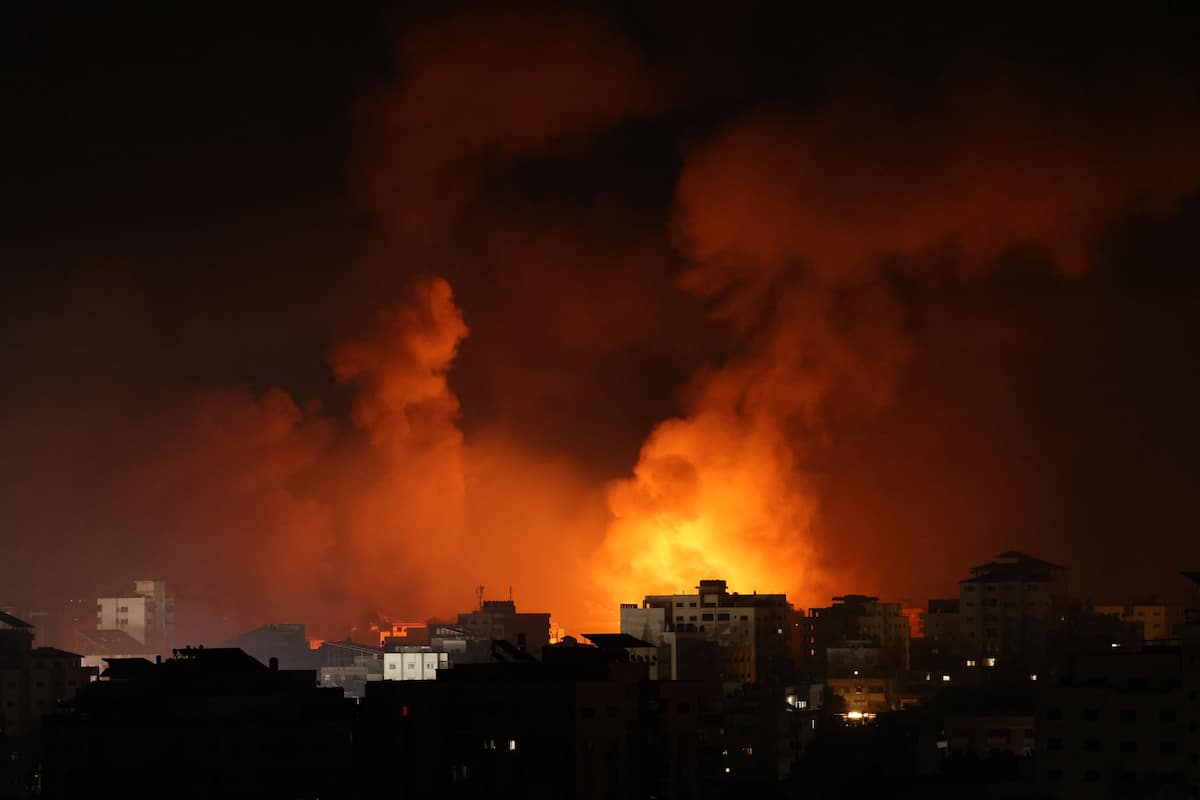Life in Gaza: The sounds of war on the most intense night of bombardments
[ad_1]

It was the most difficult night of Mohammed Jaber’s life. The walls were shaking, there was a toxic smell in the air, and the 22-year-old business student was huddled with his family in their northern Gaza home as Israeli planes conducted airstrikes across the strip. At around 1 a.m., he picked up his phone and began to record the artillery shelling nearby.
“I forgot all my dreams and my goals,” Jaber said, recounting the early hours of May 16 — the conflict’s deadliest day. “I was just needing me and my family to survive.”
As the violence between Israel and Hamas raged, the nights were punctuated by sirens, blasts and booms. A cease-fire Friday signaled a tentative end to the shelling, but for over a week, civilians have huddled together in their homes, wide-awake; in Gaza, parents have put cotton balls in their children’s ears to muffle the sound of bombardments.
[Parenting under fire]
South of Jaber’s house, planes were flying over Gaza City. Muhammad Abu Aoun was at home with his father, mother and older sister when missiles struck a residential building next door. Shaken by the explosion, he called out, “Oh, God.”
“The sound was incredibly loud and scary, and there was thick smoke from the bombs and there was fire,” the 22-year-old photojournalist said. He ran to the site and found it “completely destroyed and the bodies everywhere. I did not know what to do.”
Israeli strikes killed more than 40 people in Gaza on May 16, including 10 children. More than 200 Palestinians have died over the past 11 days.
North of Gaza, sirens filled the night in Tel Aviv as rockets flew over the city.
“We didn’t sleep,” said Janny Krepostnoy. “I felt like my whole body was shaking.”
Hamas, the militant group that controls Gaza, has lobbed more than 4,000 rockets into Israel since the fighting began. The group fired more Saturday night alone than during all of the 50-day Israel-Gaza war in 2014, according to Maj. Gen. Uri Gordin, who leads Israel’s Home Front Command.
Israel’s Iron Dome missile defense system has intercepted about 90 percent of those attacks, according to the military, but 12 people in Israel have died since the violence began. Hamas has launched barrages of rocket fire at levels not seen before in the country’s vibrant, most densely populated city.
[Tel Aviv was long known as ‘the Bubble’ for its distance from war. This time is different.]
“I never believed that that could happen in Tel Aviv,” said Krepostnoy, 25, who works at a start-up there.
“The sirens,” she added. “That was the scariest part. When you need to run somewhere. And then you hear the bombs and you hear them exploding nearby.”
Krepostnoy didn’t have a bomb shelter in her building, so she went to stay with her parents in Karmiel in northern Israel.
In Gaza, residents said they have nowhere to hide, no shelters and no escape.
As the sun rose over Gaza City on Sunday, rescuers had already spent hours digging through the rubble left behind on Wehda street. There were moments of hope as they pulled out people who had survived from underneath the demolished homes.
Riad Ishkontana was buried under the destruction for five hours before he was rescued.
There were also moments of anguish. Ishkontana was later handed the body of his dead child.
He lost four children and his wife, according to the Associated Press. Only he and his daughter Suzy survived.
The strikes, which the Israeli army said targeted Hamas’s underground tunnel network, flattened Wehda street, an area that had been filled with bustling cafes, shops and bakeries.
[The roar of an Israeli airstrike, buildings collapsed and a family buried under rubble]
Israel has said its goal is to obliterate Hamas’s capabilities and avoid civilian casualties. But for those inside Gaza, the shelling felt indiscriminate.
“We are not understanding what they’re aiming at,” said Nour Alshaer, 21, who lives in Rafah, on the territory’s border with Egypt. That night, as she heard nonstop artillery shelling, she called her friend, whose uncle and cousin were seriously injured in the violence. The medical student and her family speak with each other as if every conversation may be their last.
“We’re always asking everyone for forgiveness, because we’re ready to die.”
Hazem Balousha in Gaza City and Shira Rubin in Tel Aviv contributed to this report.
